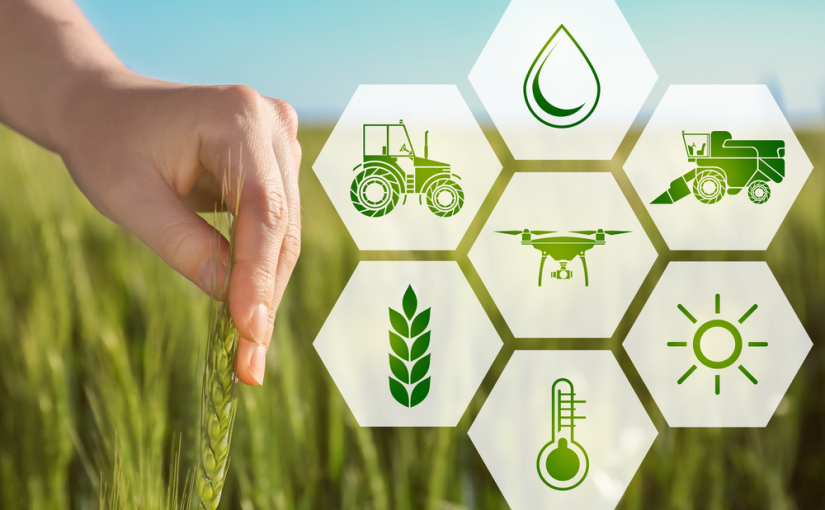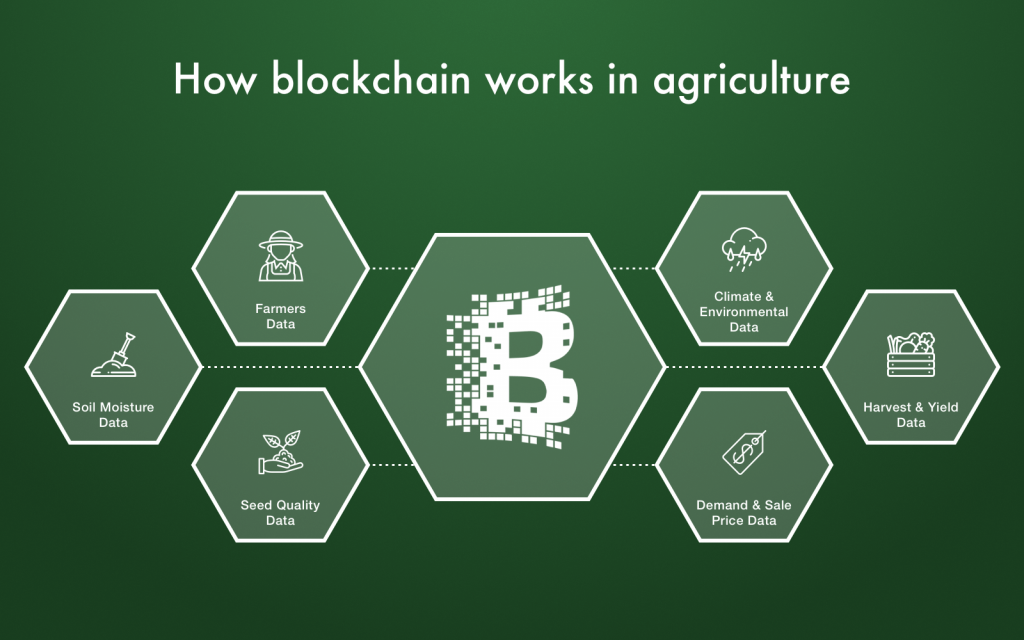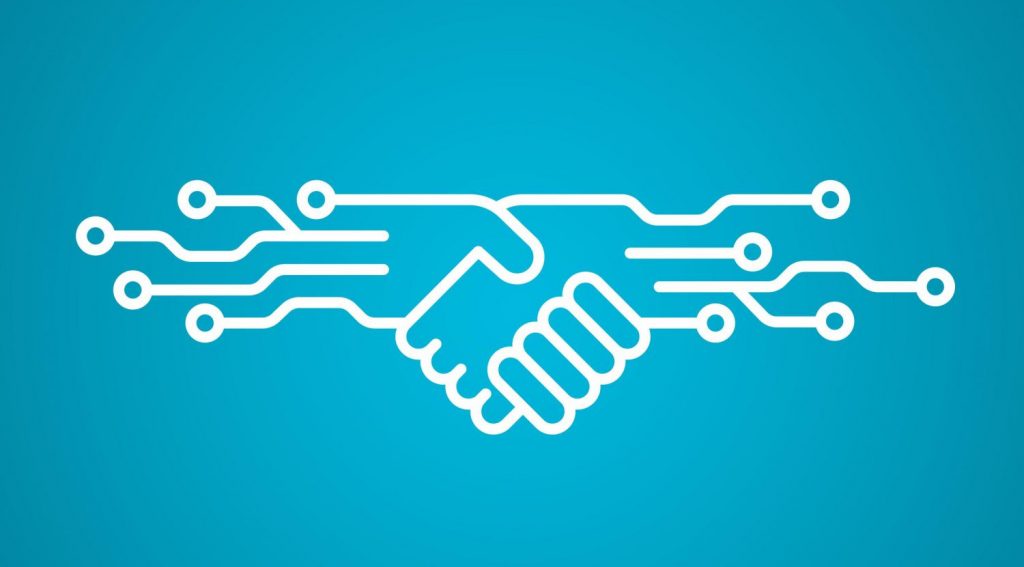On this page:
- What is blockchain and how does it work
- What are the challenges facing agriculture these days and how can blockchain solve some of them
- Improving trust
- Calculation of the cost of production
- Establish the process of loading and transporting products
- Weather Crisis Management
- Improving industry financing
- What are smart contracts
- How to implement blockchain in a few months
- Conclusion
How to Apply Blockchain in Agriculture?

Agriculture is an essential part of the infrastructure of every country, which provides the population with fresh food. Today this industry is faced with several problems that can only be solved by innovative technologies. Blockchain agriculture will be a great solution for every large and small farm. Let's try to understand how a distributed database of baths can improve the agricultural sector.
What is blockchain and how does it work?
Blockchain is one of the fastest-growing technologies of our time. It appeared only a few years ago, but today it can be used in almost all areas.
In simple terms, blockchain is a unique database that has superior protection against hacking. All data is placed here in a specific sequence. Cells are connected, and if an attack occurs from outside, then these connections are quickly destroyed.
Datum is not stored centrally, as in other databases, but scattered. The owners of the information themself decide which one to show for general viewing, and which one needs to be classified as much as possible.
Many organizations and leading educational institutions prefer to store documents on a blockchain system. The advantage of this solution is that no one can change the data. They are updated automatically or entered by a person, but you cannot change any of the information. This allows you to prevent forgery of documents, fraud on the part of employees of the institution.
In general, a blockchain is a good tool for collecting and storing important unchanging information for a long time. The technology is used free of charge and does not require large energy costs.
What are the challenges facing agriculture these days and how can blockchain solve some of them?

There are many challenges faced by food manufacturers. Among the most basic:
- Improving trust between supplier and client;
- Correct calculation of production costs;
- How to set up the process of loading and transporting products;
- Weather crisis management;
- Improved financing of the industry.
All of the above problems can be partially solved using applications of blockchain.
Improving trust
Science is developing at a tremendous speed, which has made it possible to significantly increase the volume of the harvested crop without increasing the acreage, accelerate the growth of plants and animals, and also increase the number of eggs that a hen can lay per day. The problem is that such interference with the normal course of events negatively affects the quality of the product.
Today the market is full of low-quality goods, which often leads to the development of chronic diseases, decreased immunity, obesity and many other problems. That`s why more and more people are willing to pay more, just to be sure that they receive environmentally friendly products, without GMOs, hormones, and artificial growth simulators. Blockchain is becoming a good tool that can build trust between buyers and manufacturers.
The agriculture value chain will record absolutely all purchases that the company makes, as well as take into account what fertilizers and when were used to grow the crop, what feed the animals received. The technology will record all the information received and provide it to the public. Based on the information received, the clients can evaluate the quality of the product, decide how much it meets their requirements and whether it meets the "price - quality" criterion.
In addition, the system can record when the packaging was completed, which means that the consumer can be sure of the freshness of the product. Now doing honest business has become much easier.
Calculation of the cost of production
Many farms still cannot correctly calculate the cost of production, because it depends on many factors:
- Remuneration of employees;
- The cost of seeds, fertilizers (if we are talking about crop production), the price of feed, medicines, and other preparations for animals;
- Maintenance of the vehicle fleet;
- Used electricity and fresh water for irrigation;
- Lease of land (if the farmer does not buy this land);
- Amount of harvest.
It is rather difficult to calculate all of the above data. In large holdings, there are entire departments that maintain such documentation, but what about small farms that cannot afford such a large staff. Blockchain technology can record all the costs that have been met during the year, taking into account the payment of utility bills, the purchase of equipment, and many others. Here you can also take down information about what kind of crop you harvested on what day. The supply chain blockchain will be able to do all the calculations for your farm. Now you will be sure that you will cover all costs and make a profit because you sell goods at the price that they cost.
Establish the process of loading and transporting products
Many farmers forget that logistics is of great importance for any type of sales and, as a result, they lose a lot of money. Practice shows that an unsettling process of packaging and transportation of products leads to the fact that it quickly deteriorates, the goods arrive late, and also often disappear.
Blockchain tech will record how many products were packed in each batch, which truck, and when it was loaded. The transport left the base and what time it arrived at the store. Such data will help to make sure that all employees do their job well and on time, do not steal and perform duties according to the job description.
In addition, as soon as the client receives the product, the system immediately records it. This helps to establish more trusting relationships between partners and to resolve even the most controversial issues.
Blockchain can simplify the logistics compilation process. It will track which road you drive each time, and also monitors if there are any road works, accidents or traffic jams in the area that will delay traffic. The system can analyze how effectively the paved path is used and in some cases (if you are using artificial intelligence) can offer a more effective solution. The blockchain can record absolutely all transportation costs, including car repairs and fuel consumption. This helps to prevent fraudulent activities on the part of subordinates.
Weather Crisis Management
Many people know that agriculture is directly dependent on weather conditions. Hurricanes and floods often destroy all crops, making all work to zero. In such conditions, farms incur heavy losses, which can only be covered by raising prices for the rest of the products.
Blockchain in agriculture is capable of collecting information about weather conditions in the region. The system itself will not be able to implement monitoring of weather conditions. It connects to meteorological stations, which have the necessary equipment to create the most accurate weather forecasts. Thanks to the received data, you will have time to cover crops or build defenses to prevent flooding. If you know in advance about the danger, you can find a way to prevent the irreparable.
Improving industry financing
Providing a sustainable flow of truthful information to potential financial partners and investors is one of the most important functions of blockchain.
Controlling the supply of products and production costs in agriculture is quite difficult, so many investors rarely want to invest in this industry. This industry has been experiencing a lot of problems over the past few years, so sponsorship can solve several problems.
The agriculture supply chain will allow for a more trusting relationship between sponsors and farms. It allows you to control where the money went, how expediently it was spent.
What are smart contracts?

Quite often, agribusiness owners have to make the same type of decisions, which takes a lot of time. It is better to shift such responsibilities to one of the blockchain-based technologies - smart contracts.
The person sets the parameters by which the system will determine whether the deal should be approved or it still needs to be improved.
The digital assistant will decide which projects are worth financing, with whom it is worth concluding cooperation agreements, and with whom not. The efficiency of this technology has already been appreciated by hundreds of companies around the world.
All decisions are recorded in the system and you can track them, make adjustments if you do not agree with them or they contradict your interests.
How to implement blockchain in a few months?
The farming supply chain can solve a lot of problems, so many people are thinking about how to introduce innovative technologies as quickly as possible.
First of all, you need to purchase and install data-generating IoT devices. The next step involves cleaning and structuring old data. After that, you can move on to machine learning, compiling a list of criteria that the system will track. After all the settings are done, the data will start to be stored in the blockchain system.
At first, glance, building a farming supply chain is quite difficult, and this frightens off the majority of farm owners. Nevertheless, if you turn to specialists for help and purchase the necessary equipment, then the system will start working quickly enough, all costs will pay off within a few months.
Conclusion
Apply supply chain is a good solution for those who want to optimize all processes that take place in food production. Now you can prove that you are producing really quality goods, prevent various crises, and improve investor confidence. The cost of launching this technology is relatively inexpensive, but it can solve a lot of problems.
